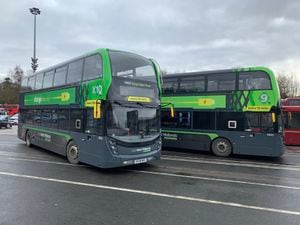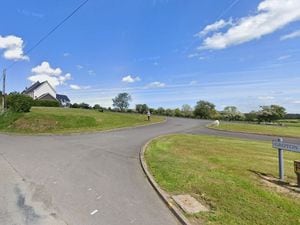West Midlands buses see fewer people than ever before
Fewer people are catching buses in the West Midlands than ever before, new figures show.

Passengers made 322 million journeys in 2017/18, a 10 million decrease on the 332 million journeys the previous year.
In the government's official figures, Shropshire, Herefordshire, Staffordshire, Warwickshire and Worcestershire are classified under the West Midlands – and it has been argued that these rural areas are skewing the figures for the more urban areas.
However across the Transport for West Midlands area, which includes the Black Country, the number of journeys fell from 265.9 million in 2016/17 to 259.4 million in the last financial year.
In Shropshire the number of journeys fell from 4.6 million to 4.3 million, while Staffordshire saw its 18.3 million journeys drop to 16.6 million.
Transport for West Midlands (TfWM) insists its bus operators, including National Express, have not seen the same level of decline as reported by the government's figures. National Express West Midlands says it has seen a one per cent rise in fare-paying passengers in the last year, while also reporting a 12 per cent rise in the number of young people using their buses.
A spokesperson for TfWM said: “The government's figures are to March 2018. Since then bus Operators in the West Midlands Bus Alliance Area have seen this trend reversed.
“Whilst there have been reductions in patronage in recent years the work of all partners within the Alliance has helped to stabilise and more recently show upturns in passenger numbers. This work has included the introduction of low fare zones, schemes to improve bus journeys times, introduction of new cleaner vehicles and introduction of half price travel for all apprentices and trainees under 18.
“To build on this strong base The Strategic Vision for Bus, published in November, sets out our key aims to make bus travel more attractive in the future by managing congestion, improving safety, making it easier to catch the bus and offering better value for money. The bus still accounts for 4 out of every 5 public transport trips in the West Midlands and plays a vital role in supporting the local and regional economy. “
A spokeswoman for National Express West Midlands added: "In the last year, National Express West Midlands has seen growth of more than one per cent in fare-paying passengers.
"We have done this by working in partnership with Transport for West Midlands through our award-winning Bus Alliance to make bus travel better for our customers. This joint working has brought highways improvements that tackle congestion and speed up bus journeys.
"We have been innovative in targeting price cuts to get people travelling more by bus. When we launched our first low-fare zone – in Sandwell and Dudley – aimed at shoppers in local town centres, we saw 4,000 extra bus journeys per day.
"National Express West Midlands has massively invested in contactless and mobile ticketing – without stopping people paying in cash – to make it simpler to get the bus. This has worked especially well with the West Midlands’ young people – 12 per cent more younger customers are now using the bus.
"We’ve also spent millions on brand-new top-spec buses with extra leg room, free wi-fi and USB chargers. Our existing customers tell us how much they like these beautiful buses, and where we’ve upgraded routes to Platinum, we’ve attracted new bus customers.
"We’ve just spent £8 million on 28 of these Platinums for our Pensnett garage. Six will go on the X10, and we're replacing all 13 buses on route 9 with Platinums. This will be the first time Platinum buses will serve Lye and Stourbridge."
Since records began in 1985/86, the West Midlands has seen a decrease of more than 260 million bus journeys being taken by passengers.
The number of journeys has decreased every year since 1985 bar four.
Across the UK around 4.8 billion bus journeys were taken in 2017/18, a decrease on the 4.9 billion from the previous year.
In 1970 passengers made more than 8.6 billion journeys.





